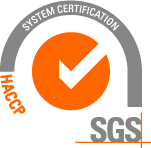Hazard Analysis Critical Control Point (HACCP)


Hazard Analysis Critical Control Point (HACCP) is a systematic approach to the identification, evaluation, and control of food safety hazards. It is a proactive strategy designed to identify and assess potential food safety hazards. Control measures are then designed to prevent, reduce, or eliminate the identified hazards.
Pacific Blends began to develop its own HACCP plan in 2002. Before developing the HACCP program, we established prerequisite programs as the foundation for the strong HACCP plan. These programs range from premises management to allergens control. They set control measures to ensure a safe production of finished products and to manage the hazards identified by our HACCP team.
Following the seven HACCP principles, the team developed a set of plans appropriate to our products and processes. Through careful review of the facility's operations, Critical Control Points (CCPs) within the production process were identified and monitoring methods were developed to show when critical limits in the products are reached. The team also created a solid corrective response procedure to resolve issues as they appear.
Pacific Blends completed the implementation of its HACCP plans and became a HACCP-certified facility in 2006. We maintain our HACCP-quality production with documentation, ongoing internal HACCP audits, and annual third party review by our auditors, SGS Canada.
